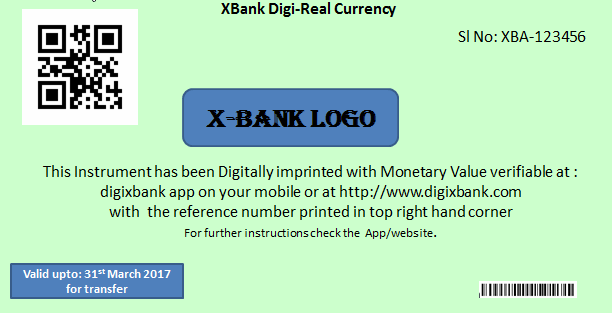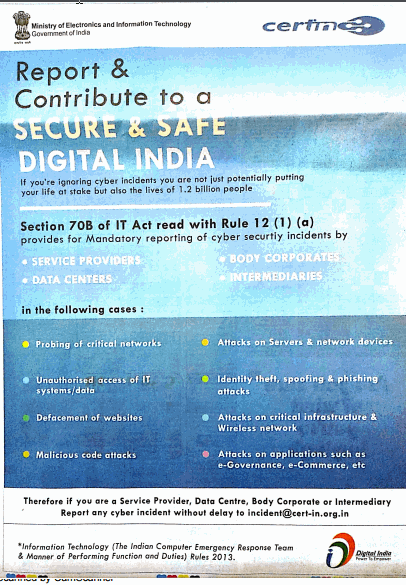P.S: At the request of some of my friends, I have elaborated here the concept of Ze-Mo coupons I referred to in my previous article as a possible solution to the post-demonetization measure where there is a shortage of currency in the market. This solution was part of the patent applied solution titled “Digital Value Imprinted Instrument System” applied in 2003 and subsequently not pursued for various reasons. Presently the copyright is still with Naavi. However in the interest of the needs of the country at this point of time, I am publishing this solution with the hope that it can be exploited by either the Government owned Banks or any FinTech Company. There are a few more security aspects that can be incorporated in the solution beyond what is presented here to make the solution more robust….. Naavi
I present here a solution to the post demonetization problem that we are facing in India today where there is a serious shortage of currency notes. It is stated that the printing capacity of RBI indicate that it will take some more time for the withdrawn notes to be replaced fully.
The solution presented here is an adaptation of Naavi’s “Digital Value Imprinted Instrument System (DVIIS) as a “Digi-Real Currency” which will look as under. (May be printed on the security paper used in cheques)

This will be a form of a hybrid instrument which uses the “Brick and Click” technology. It is a digital currency with a physical existence. People can hold it, feel it and hand it over to another person as they do now using a currency note.
However, there is no monetary value written on the instrument. The monetary value can be found by either checking the serial number on a website or on a mobile app. Persons with QR code reader or bar code reader can use them with or without the app .
The basic instrument is issued by a Bank in the form of books with “Zero Value” on the instrument.
The holder can then use the App/website, enter the serial number and load an amount on the instrument such as Rs 50,Rs 100, Rs 500 or Rs 2000 or for that matter any other amount also by transferring the value from his account to the digireal cheque. In this aspect it will be similar to a “pre-paid card” but the difference is that the Digi Real coupon is actually handed over to the person to whom the holder wants to pay some money and the receiver has the psychological satisfaction of holding the instrument with monetary value embedded inside.
Compared to the completely digital system that the “Mobile Wallets” etc represent, this Digi Real Currency is like filling up the missing link between the purely physical instrument based currency system as we use today and the proposed digital payment system. Ideally this should have come first before the introduction of the pure digital systems but currently we have moved ahead by leaping across. Those who donot have the strength to leap fully are the people who will benefit by this intermediary solution that enables transformation in easy to digest steps.
This system is different from the Sodexo type of coupons where the value is printed on the instrument because it is easy to duplicate. By not indicating the value on the instrument, the acceptor is forced to “Verify” the value. If he so desires, he can note the value as read by him on the back of the instrument where there will be space for keeping notes.
Verification of value can be done by several alternate means of entering the number into an SMS, or read a QR code or read a Bar code. Even IVR system can be configured for the purpose.
It is also different from any instruments issued by the Banks today against payment since in such instruments similar to DDs or Certified Cheques or Cash Cards, the customer has to first block his funds to get the pre-paid instruments where as in this instrument he can keep the blank instruments with him and use it for any denomination and commit his funds only at the time of use.
The holder will be given the option to
a) Extinguish the instrument by transferring the money to any bank account through the App
b) Hand over the instrument to another person without himself encashing it
c) Disable further transfer permanently or temporarily by locking the instrument ( preventing theft)
The current printing capacity for cheques by Banks should be sufficient to print required number of this instrument which will be about half or one fourth the size of a current account cheque book. This will reduce the cost of paper used. Also part of the back of the instrument can be used for advertisement to subsidize the cost.
It can be supplied to the customers and delivered at their homes so that they need not que up at the Banks. Each book can be used in any denomination of currency so that the shortage of one or other denomination does not arise. Eventually this instrument can enable the “Cashless Society” that we are dreaming off.
The system will prevent hoarding of this currency by putting an expiry date on the instrument after which it can only be transferred to the Bank account and extinguished. The instrument will therefore be in circulation all the time.
The system has many hidden security features all of which I have not discussed here. It will be more tamper proof than the currency except for the need for people to understand the use of App. In this respect it is not different from the Mobile Wallets, USSD codes or UPI apps. But it should be easier to understand and use than these apps. The only necessary operation that an ordinary man on the street needs to know is “How to Verify the value”. The other aspect is transfering the value to his account for which he can use assistance of other knowledgeable persons if required or the Bank itself where he can deposit the instruments like any other cheque.
The only risk that will remain will be “Hacking of the server” in which the value of the instrument is maintained. But if we today trust the Banks for our money in their core banking software, we should trust them also for this data base of digit-real currency. The need for strengthening the security in this system as well as the need for protective measures such as Cyber Insurance etc will continue.
The possibility of a “Denial of Access” is also a risk that frustrates the system. This has to be tackled by proper distributed system of authentication that can be configured by the Banks. The load on the system is of course not high since compared to the current transaction authentication related system load, query authentication involved in this instrument has a lower load on the systems and bandwidth. The “Query” received would be to validate a given number of the instrument and return the value recorded against it. There is no need to authenticate the transferor, transferee and initiating a transfer instruction from one bank account to another.
I am presenting this commercially valuable suggestion here so that the Government/NPCI/Banks can make use of it if it desires.
If any FinTech company intends to develop this product, I will be able to assist them in developing the solution with appropriate modifications as may be required.
Naavi
(Comments are welcome)








